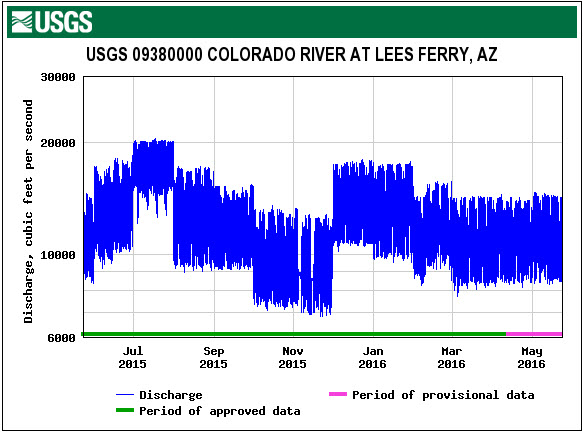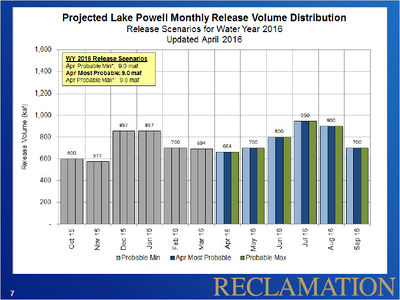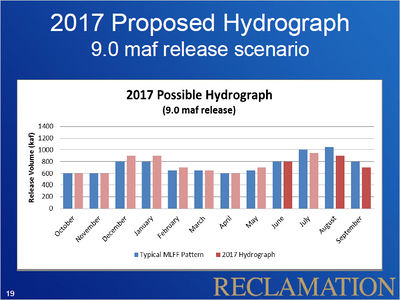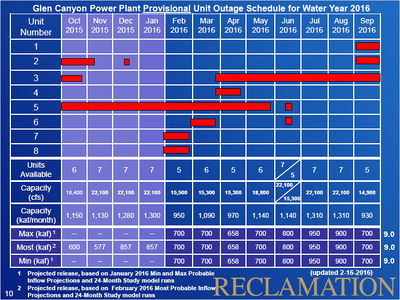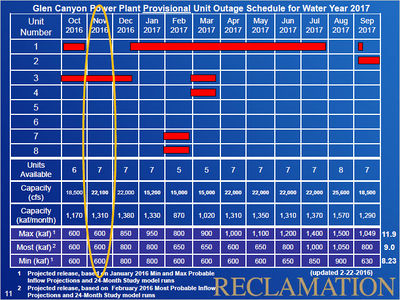Difference between revisions of "GCDAMP Glen Canyon Dam"
Cellsworth (Talk | contribs) |
Cellsworth (Talk | contribs) |
||
| Line 87: | Line 87: | ||
'''2014''' | '''2014''' | ||
*[http://www.usbr.gov/uc/rm/amp/twg/mtgs/14oct28/Attach_09.pdf Colorado River Annual Operating Plan and Drought Contingency Planning ] | *[http://www.usbr.gov/uc/rm/amp/twg/mtgs/14oct28/Attach_09.pdf Colorado River Annual Operating Plan and Drought Contingency Planning ] | ||
| − | *[http://www.usbr.gov/uc/rm/amp/amwg/mtgs/14aug27/Attach_02a.pdf | + | *[http://www.usbr.gov/uc/rm/amp/amwg/mtgs/14aug27/Attach_02a.pdf Basin Hydrology, Operations ] |
*[http://www.usbr.gov/uc/rm/amp/amwg/mtgs/14aug27/Attach_02b.pdf DOI-DOE Hydrograph Development for Water Year 2015 ] | *[http://www.usbr.gov/uc/rm/amp/amwg/mtgs/14aug27/Attach_02b.pdf DOI-DOE Hydrograph Development for Water Year 2015 ] | ||
| − | *[http://www.usbr.gov/uc/rm/amp/amwg/mtgs/14may27/Attach_01.pdf| | + | *[http://www.usbr.gov/uc/rm/amp/amwg/mtgs/14may27/Attach_01.pdf| Basin Hydrology, Operations, and 2015 Hydrograph and AIF: Development of Water Year 2015 Hydrograph ] |
| − | *[http://www.usbr.gov/uc/rm/amp/amwg/mtgs/14feb19/Attach_02.pdf| | + | *[http://www.usbr.gov/uc/rm/amp/amwg/mtgs/14feb19/Attach_02.pdf| Basin Hydrology, Operations, and 2015 Hydrograph ] |
| + | *[http://www.usbr.gov/uc/rm/amp/amwg/mtgs/14feb19/Attach_03a.pdf| Panel on the Potential Effects of Long-Term Drought on Colorado River Operations ] | ||
| + | *[http://www.usbr.gov/uc/rm/amp/amwg/mtgs/14feb19/Attach_03b.pdf| Near Term Risks: Options to Address Declining Reservoirs ] | ||
| + | *[http://www.usbr.gov/uc/rm/amp/amwg/mtgs/14feb19/Attach_03c.pdf| State of Nevada Concerns ] | ||
|- | |- | ||
Revision as of 12:13, 16 August 2016
|
Current OperationsThe operating tier for water year 2016 was established in August 2015 as the Upper Elevation Balancing Tier. The April 2016 24-Month Study established that Lake Powell operations will be governed by balancing for the remainder of water year 2016. Under balancing, the contents of Lake Powell and Lake Mead will be balanced by the end of the water year, but not more than 9.0 maf and not less than 8.23 maf shall be released from Lake Powell. Based on the most probable inflow forecast, this June 24-Month Study projects a balancing release of 9.0 maf in water year 2016; the actual release in water year 2016, however, will depend on hydrology in the remainder of water year and will range from 8.23 to 9.0 maf. The projected release from Lake Powell in water year 2016 will be updated each month throughout the remainder of the water year. Reclamation will schedule operations at Glen Canyon Dam to achieve as practicably as possible the appropriate total annual release volume by September 30, 2016. In June, the release volume will be approximately 800 kaf, with fluctuations anticipated between about 9,000 cfs in the nighttime to about 17,000 cfs in the daytime and consistent with the Glen Canyon Operating Criteria (Federal Register, Volume 62, No. 41, March 3, 1997). The anticipated release volume for July is 950 kaf with daily fluctuations between approximately 11,500 cfs and 19,500 cfs. The expected release for August is 900 kaf with daily fluctuations between approximately 10,000 cfs and 18,000 cfs. |
| --- | --- | --- |
|---|
|
|
